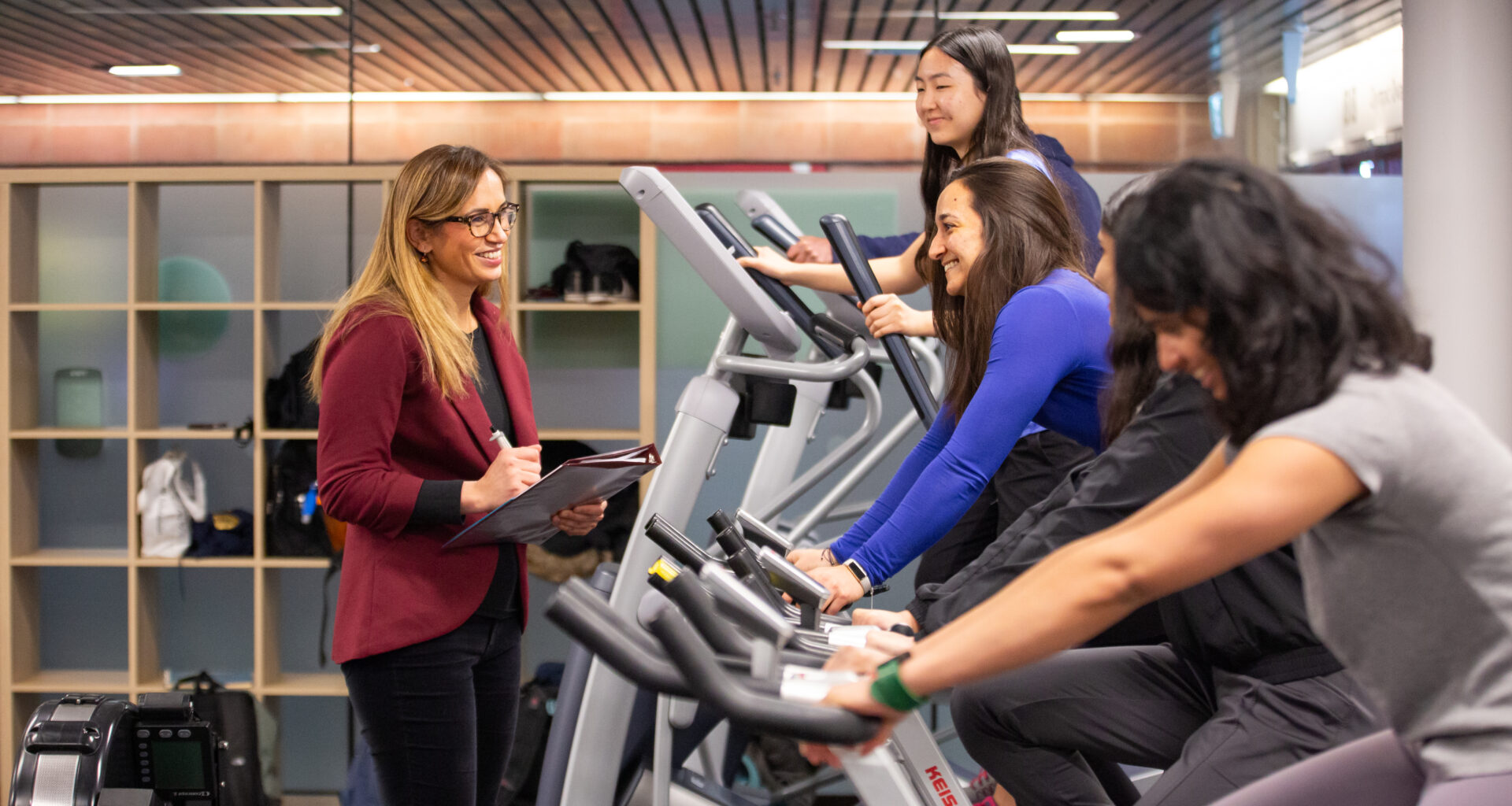Written by Jacquie Moore, BA’97
“Wouldn’t it be great if you could take a pill that kept your brain looking healthy and functioning perfectly from womb to tomb?” The only answer to that question posed by neuroscientist Dr. Cindy Barha, PhD, in a recent presentation for Amazing Brain Science Talks is, of course, “Yes, please!”
Alas, while there’s no magic prescription out there, Barha’s research demonstrates that there is something we can do to potentially delay long-term brain disorders such as dementia — that is, exercise.
Barha is a professor of kinesiology and a multidisciplinary researcher with expertise in behavioural neuroscience, neuroendocrinology and exercise neuroscience. Recently awarded a prestigious Canada Research Chair in Neuroscience, Brain Health and Exercise, Barha is fascinated by brain health in adults and how biological sex and genetics are moderators of exercise efficiency. She’s particularly interested in the utility of exercise as “medicine for the brain and how it can be prescribed more effectively.”
So far, Barha and her team in the Faculty of Kinesiology and the Hotchkiss Brain Institute have found that aerobic exercise improved cognition for older females. She says they think further studies may reveal that, “exercise will also be more effective in middle-aged females … as this is the time of life they are going through the menopause transition and their brains are more vulnerable.”
Delaying dementia
Most of us know someone suffering from dementia, a term for a number of brain disorders (such as Alzheimer’s disease) that impair memory, reasoning and social function. As Canada’s population ages, rates of dementia are on the rise; Barha points to the Alzheimer Society of Canada’s national Landmark Study that predicts that, by the year 2050, 6.3 million Canadians will be diagnosed with some form of dementia.
“A case of dementia is diagnosed every three seconds around the world,” she says. “If we can delay its onset by even a year, that would result in 500,000 fewer cases in Canada by 2050.” Over the course of a decade, that would add up to nearly four million fewer cases. Prevention, says Barha, “is obviously a primary concern.”
Females are at greater risk
More than two-thirds of Canadians with dementia are female. Barha says the reasons for that are complex, including that females have longer life-expectancy than males but, she says, “females also have more Alzheimer’s disease neuropathology within our brain.” As well, females are more likely to show greater cognitive decline after being diagnosed with dementia and are at higher risk due to reproductive experiences and hormonal changes. For instance, female brains can become either more or less neuroplastic, depending on the number of pregnancies an individual has experienced.

“Research has shown that in humans, having 5 or more pregnancies or having zero pregnancies earlier in life are both associated with a higher risk of developing Alzheimer’s,” says Barha. “This may be related to differences in neuroplasticity in older age as our previous research shows that, using a rodent model of menopause, having a couple of pregnancies versus zero pregnancies led brains to have more neuroplasticity in older age.”
In studying the impact of exercise for those two groups – women having had no pregnancies or five or more – Barha has found a stronger relationship between higher levels of physical activity and better cognition in older females.
The bottom line, says Barha, “is that females are at the centre of this disease.”
How does exercise improve that?
Some of Barha’s research shows aerobic exercise is more effective at improving daily executive functions (i.e., juggling tasks, planning, ignoring distractions) in older females than in older males. “Exercise may be most beneficial for those of us who are at the most risk of dementia and cognitive decline,” she says.
In embarking on research to see if sex differences exist in the effect of aerobic exercise on the brain, Barha and her team measured executive functions in males and females following a six-month-long walking-intervention comparison.
“We thought perhaps we’d find that improved brain cognition was linked to better cardio fitness for both groups,” she says. As it turned out, Barha and her team found that, while an increase in cardio activity resulted in better cardio fitness in males, it had little to no effect on their executive brain function. On the other hand, females who increased their cardio activity showed an improvement in executive functions. Surprised by that difference, Barha and her team decided to explore the naturally occurring protein in the brain called BDNF (brain-derived neurotrophic factor), which plays a crucial role in memory and learning function and brain-cell health.
“Our work supports the idea that exercise is influencing the female brain through this substance, BDNF,” says Barha. “We’re finding that females seem to get a greater increase in BDNF after aerobic training than males.”
What if I’ve never exercised before?
That’s okay! It’s never too late to start being physically active, says Barha.
“Research shows that, even if you’ve been physically inactive for the majority of your life, if you start a regular exercise routine in your 60s, 70s or even in your 80s, it’s still going to be beneficial for your brain structure and brain function,” she says. Reassuringly, she adds, “you don’t need to run a marathon or try to look like Dwayne ‘The Rock’ Johnson.” (Whew!) A daily brisk, 10-minute walk can be enough to benefit brain health, says Barha, who also suggests simply taking the stairs more often or playing more intentionally with the grandchildren.
Barha says there are still many unknowns to explore, such as how resistance training versus aerobic exercise might influence brain health for males and females at certain stages in life.
“We’re not quite at the stage of being able to prescribe exercise as precision medicine,” she says. But, she adds, “we do know that being physically active is really good for your body and for your brain.”




